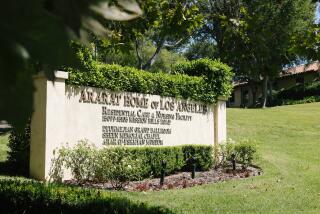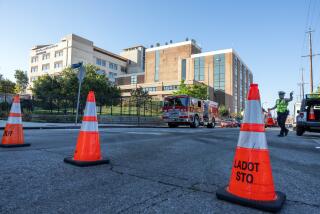Hospital Called Faulty, Shut Down
State regulators shut down a Rancho Cucamonga hospital this month, where at least three patients died after they allegedly received inept and inadequate medical care, including use of contaminated equipment to cut costs and failure to provide life-sustaining nutrition to a seriously ill patient.
At least twice, Angels Hospital -- a small, acute-care facility -- failed to have a doctor available for emergencies, and hospital staffers were forced to summon paramedics by calling 911, according to the California Department of Health Services. In each of the two cases, the patient died.
“The systems of care, the nursing services, infection control, pharmacy services ... I can’t speculate as to the reason, but the net effect is the systems were not functioning,” said Brenda Klutz, deputy director of the state health agency. “I mean here’s an acute-care hospital that’s calling 911.”
Only in extremely rare occasions has the state ordered the immediate closure of a hospital.
Angels Hospital opened just last year after new owners bought out the vacant, bankrupt Heritage Hospital, a 55-bed facility. The hospital has no emergency room and when closed this month had only six inpatients.
On May 7, after state inspectors toured the hospital and reviewed records, Klutz ordered the inpatients to be moved elsewhere within hours and ordered administrators to halt all surgeries.
State inspectors also found that, at least once, hospital staffers turned down sound alarms on cardiac telemetry machines -- “so low they could not be heard throughout the unit” -- and staffers were not monitoring the machines, designed to detect “potentially fatal” cardiac arrests.
“It’s just an extremely dangerous practice,” said Klutz. “It’s not safe. It’s not sound medical practice. It’s just dangerous.”
The investigation into the deaths and other missteps could lead to criminal charges, Klutz said. Regulators also referred one doctor at the hospital to the Medical Board of California for possible disciplinary action.
The licensed owner of Angels Hospital, Marylou Fernando of Rancho Palos Verdes, could not be reached for comment.
A former chief executive officer of Angels Hospital, Larry R. McFarland, said Tuesday that he quit in March -- before the patient deaths -- because of some “fundamental disagreements with the owner” and said he had no authority over the hospital’s finances.
“It was just a situation where we decided to part,” McFarland said, declining to elaborate. “We had a difference in philosophy.”
On May 12, Klutz signed a temporary suspension order to close the facility and ordered it to stop submitting claims for Medicare and Medi-Cal payments.
Klutz said that, in her 12 years with the department, she had never issued an order to immediately close a hospital. Regulators often give hospitals time to correct problems, and rarely is a facility shut down.
“It’s an extreme situation,” Klutz said. She said her staff responded after receiving complaints from current and former hospital staffers, and a family member of a patient who died. “We decided we needed to act very quickly.”
Officials with a national hospital healthcare group agreed that the action was unusual.
“I’ve never heard of it happening,” said Jonathan Small, spokesman with the Institute for Healthcare Improvement, a Boston-based organization that has worked with hundreds of hospitals nationally to improve medical care.
Angels Hospital provided surgeries and other procedures that required acute, overnight hospital care, Klutz said.
Inspectors said they found numerous unsafe practices, which in some cases preceded a patient’s death:
* On March 12, a patient suffered a “code blue” serious medical emergency at 7:05 a.m. No doctor was on duty, and no effort was made to contact one. Staffers called 911, but paramedics could not revive the patient, who was declared dead 40 minutes later.
* On March 21, a second patient went into “code blue” emergency status at 11:30 p.m., not breathing and with low blood pressure. An unqualified “respiratory care practitioner” tried unsuccessfully to insert a breathing tube in the patient. An hour later, paramedics arrived and inserted the tube. Fifteen minutes later, the patient was pronounced dead.
* Another patient died March 26 of heart and lung arrest, infection, bleeding and pneumonia. Klutz said hospital records showed that although hospital policy was to change ventilator tubing every 48 hours for sanitary reasons, the hospital changed tubing that month only when it was visibly soiled, because of budget constraints. In a period of more than a month, the patient’s tubing was changed just twice.
Laboratory tests for the same patient showed reduced serum and blood protein levels on March 11, but a “pharmacist wrote an order to decrease the amount or percentage of amino acids ... to correct the condition. There was no documented rationale for the decrease,” according to the hospital license suspension order.
* On April 24, hospital records indicated, another patient had been pronounced dead at 2 p.m. But another notation, at 3:45 p.m., stated that the patient had become nonresponsive, and that drugs were being administered.
Klutz’s report stated that the hospital had no registered pharmacist and that medications ordered by doctors were not always obtained and administered to patients.
Regulators expect to finish a formal investigation this week, which also will be forwarded to federal Medicare and Medicaid regulators.
Klutz said a state hearing would be scheduled before an administrative law judge, who will determine whether the hospital should be permanently closed. The findings may also be forwarded to local law enforcement or the state attorney general for possible criminal prosecution.
McFarland said that after Fernando bought the hospital, her husband, Rolando Fernando, helped with administrative duties. He was named in published reports as a co-owner of the hospital with his wife but is not officially listed as an owner and was not listed in the state regulatory accusation.
Rolando Fernando surrendered his physician and surgeon license Sept. 1 after the Medical Board of California formally accused him of negligent care of cosmetic surgery patients, insurance fraud and falsely stating that a patient needed tumors removed.
Neither Rolando Fernando nor his attorney in the proceedings, Donald B. Marks, could be reached Tuesday for comment.
*
Times staff writers Wendy Thermos and Hugo Martin contributed to this report.
More to Read
Sign up for Essential California
The most important California stories and recommendations in your inbox every morning.
You may occasionally receive promotional content from the Los Angeles Times.










